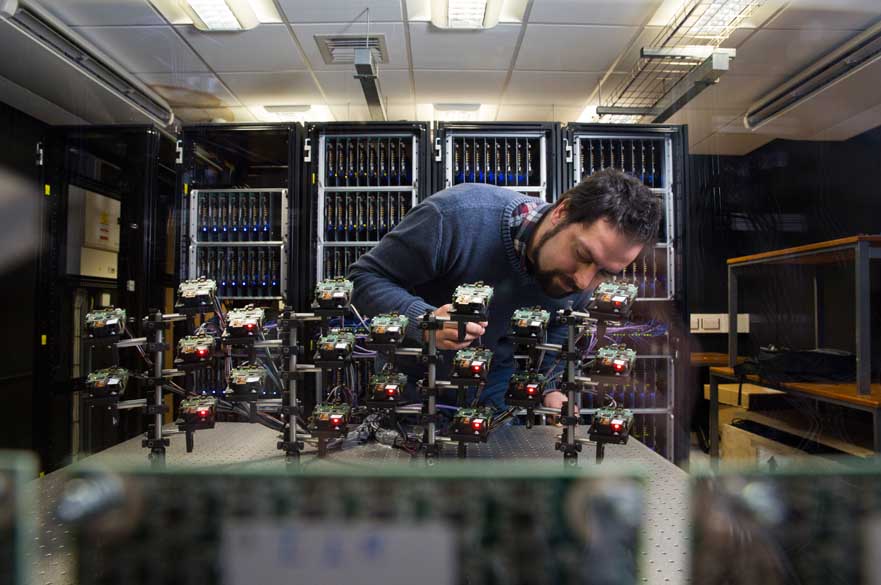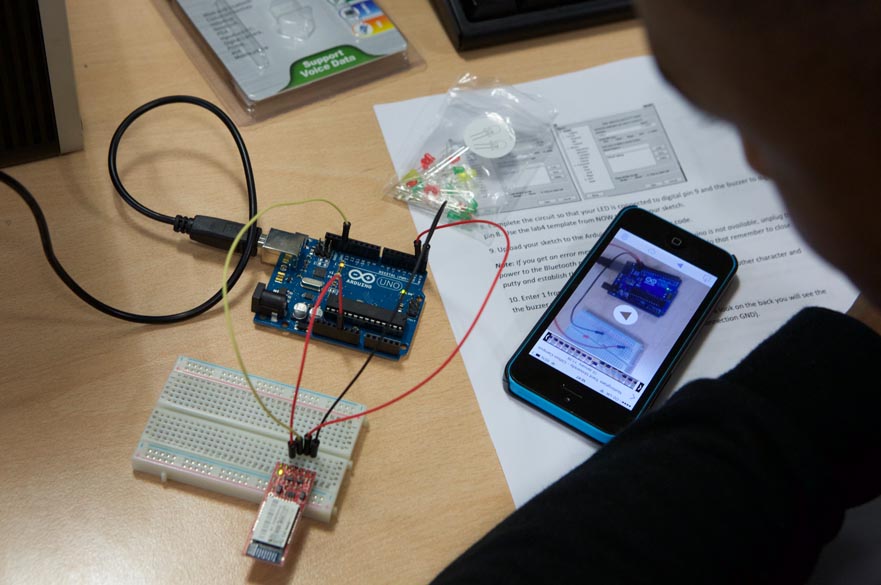Cloud and Enterprise Computing MSc
About this course
You will learn the principles and techniques necessary for designing, developing, and evaluating Enterprise Information System (EIS) that are distributed, interoperable, intelligent, and adaptive to change. In addition, the major project element of the course will allow you an opportunity to develop greater subject specialism in one specific Cloud or Enterprise computing topic of your choice.
-
Gain valuable workplace experience to enhance your skills with a year-long work placement opportunity.
-
In the last Research Excellence Framework (REF 2021) - the UK's system for assessing the quality and impact of research in universities - we’re proud that 80% of NTU's Computer Science and Informatics submission was assessed to be either world-leading or internationally excellent.
-
100% of postgraduate Information Technology students who entered employment are in a 'High Skilled' role 15 months after finishing their degrees (Graduate Outcomes Survey 2020/21).
What you’ll study
You will study six core modules in the first three terms and conduct your research project in your final term. If you are a part-time student, you will continue to study the second year from the modules listed below.
Advanced Software Engineering (20 cp)
Extend your existing programming skills and develop expertise in a variety of intelligent system engineering contexts and object-orientated program development.
Entrepreneurial Leadership and Project Management (20 cp)
You will develop your appreciation of entrepreneurship and leadership, and their role in economic development, project management and entrepreneurial business success. You will learn the tools and methodologies for effective project management.
Enterprise and Cloud Systems Management (20 cp)
This module develops your understanding of the business management issues associated with the adoption of Cloud services for organisations. You will learn how to manage the transition from a traditional IT infrastructure to Cloud services for a business organisation.
Service-Oriented Cloud Technologies (20 cp)
Learn the theory, practice, and advanced techniques associated with implementing large-scale distributed computing systems in Service-Oriented Architectures (SOA). Gain the necessary knowledge to design and implement enterprise-level computer applications and associated data-storage as services that can be cost-effectively deployed in scalable Cloud infrastructures.
Network and Cloud Security (20 cp)
Develop your knowledge of the security problems associated with computer networks and the main technologies relating to network securities. You’ll learn about the challenges of migrating a networked computing solutions to Cloud infrastructure while addressing the associated security risks.
Research Methods (20 cp)
This module develops your understanding of research design and methodology. As well as being introduced to the School's research facilities, you will develop the skills necessary for research and for writing a project definition document.
Major Project (60 cp)
You will develop advanced skills in a relevant specialist topic area through the completion of a research project. The project integrates knowledge of the course and includes the design and / or development of an innovative solution to a complex and challenging technical problem presented as a dissertation or technical research paper.
We regularly review and update our course content based on student and employer feedback, ensuring that all of our courses remain current and relevant. This may result in changes to module content or module availability in future years.
Video Gallery
How you're taught
The postgraduate academic year is divided into three terms, each of ten weeks plus a 15-week independent study period for MSc students. If you take the sandwich route, you will take a one-year work placement after the first three terms before returning to NTU the following year to start your research project.
All modules are assessed either by coursework, case studies or dissertation and there are no formal examinations. Laboratory session and workshops are assessed through coursework reports and presentations.
You will learn through:
- lectures
- specialist laboratory sessions
- seminars
- project work
Learn a new language
Alongside your study you also have the opportunity to learn a new language. The University Language Programme (ULP) is available to all students and gives you the option of learning a totally new language or improving the skills you already have. Find out more about the ULP.
Research informed teaching
By daring to think differently our research is tackling real-world issues. The subjects you will study with us are informed by our research so you can be sure your knowledge will be cutting-edge in your field. In the last Research Excellence Framework (REF 2021) - the UK's system for assessing the quality and impact of research in universities - we’re proud that 80% of NTU's Computer Science and Informatics submission was assessed to be either world-leading or internationally excellent.
Contact hours
Lectures / seminars / workshops (20%) and independent study (80%)
Careers and employability
The industry-focused nature of this course will ensure that you stand out from the crowd when it comes to job applications and pursuing your future career. Nottingham Trent University graduates are widely respected amongst employers and our Computing and Informatics students are perceived as having a competitive edge due to the hands-on approach of our teaching.
You will be particularly attractive to organisations seeking to integrate their Enterprise-wide applications (EAI), automate Business to Business (B2B) relationships with other partners, or migrate their application services to scalable Cloud infrastructures.
Alternatively, you will be fully equipped to continue your studies to Doctorate (PhD) level at any UK or EU university.
Placement opportunities
NTU is one of the most employment-focused universities. Increasingly, employers want to recruit graduates who have real-world work experience. That’s why all of our courses, across every subject area, offer you a work experience opportunity. Our experts help build and support your future with a range of career programmes and events.
The school of Science and Technology will work closely with you to help find a placement and strengthen your CV and interview techniques. You'll be supported and assessed throughout your placement year and will write a reflective report and diary at the end of your placement. When you successfully complete your placement and submit your placement report, you will be eligible to receive an additional award of a Postgraduate Diploma in Professional Practice.
Please note that placements are not guaranteed and the process is competitive through an application and interview process.
If you take the sandwich route, you will take a one-year work placement after the first three terms before returning to NTU the following year to start your research project.
Our recent students have taken placements across a wide range of companies including Prism UK, Gedling Borough Council and ENSEK. They secured varied roles such as Systems Integration Engineer, Cloud Operations Engineer and Software Engineer.
Re:search Re:imagined
To us, research is about more than writing papers and proposing new ideas. By daring to think differently, we’re disrupting the research landscape and finding the answers to the questions that really matter. From conservation management to sustainable farming, we’re inspiring the brightest minds to rise up and find solutions to some of the most significant global challenges facing society.
NTU Enterprise
You'll also have the opportunity to turn your ideas into a viable business with help from NTU Enterprise, NTU's purpose-built Centre for Entrepreneurship and Enterprise, a support centre to help students create, develop and grow their own businesses.
Campus and facilities
You’ll mainly be studying in the Interdisciplinary Science and Technology Centre (ISTeC) with access to facilities including a Games Development Lab Robotics lab and a High Performance Computing Suite.
Our self-contained, community-focused Clifton Campus has been designed to keep students busy between lectures. Catch-up with your course mates in the Pavilion’s barista café and Refectory; brainstorm group presentations in chic and stylish study spaces; enjoy some proper R&R in The Point, home of our Students’ Union. The campus also hosts the multimillion-pound Clifton Sports Hub, offering great options for everyone — whatever your interests, and however competitive you’d like to get!
You’re also right next to the bright lights of Nottingham — one of Britain’s top 10 student cities, and one of Europe’s top 25. All through termtime, a dedicated on-campus bus service will get you to the heart of the action (and back) in under 25 minutes. You’ll find a city stuffed with history, culture, and well-kept secrets to discover at your leisure: enjoy lush green spaces, galleries, hidden cinemas and vintage shopping by day, and an acclaimed food, drink and social scene by night.
Entry requirements
What are we looking for?
- A UK honours degree (2.2 minimum) or equivalent in a Computer Science or Computing related subject such as Software Engineering and Information Systems.
- Applicants with relevant employment experience or other relevant qualifications will also be considered.
NTU may admit a student with advanced standing beyond the beginning of a course, through an assessment of that student's prior learning, whether it is certificated or uncertificated. Our Recognition of Prior Learning and Credit Transfer Policy outlines the process and options available to these prospective students, such as recognising experiential learning or transferring to a similar course at another institution, otherwise known as credit transfer.
All prospective students who wish to apply via Recognition of Prior Learning should initially contact the central Admissions and Enquiries Team who will be able to support you through the process.
Getting in touch
If you need more help or information, get in touch through our enquiry form
You will need:
- A UK honours degree (2.2 minimum) or equivalent in a Computer Science or Computing related subject such as Software Engineering and Information Systems.
- Applicants with relevant employment experience or other relevant qualifications will also be considered
International qualifications
We accept qualifications from all over the world – check yours here:
Postgraduate preparation courses (Pre-Masters)
If you don’t yet meet our entry requirements, we offer Pre-Masters courses through our partner Nottingham Trent International College (NTIC), based on our City Campus:
English language entry requirements
You can meet our language requirements by successfully completing our pre-sessional English course for an agreed length of time, or by submitting the required grade in one of our accepted English language tests, such as IELTS:
Would you like some advice on your study plans?
Our international teams are highly experienced in answering queries from students all over the world. We also have members of staff based in Vietnam, China, India and Nigeria and work with a worldwide network of education counsellors.
- Complete this simple form to keep in touch with the International Office.
Fees and funding
The course fees for September 2025 entry are:
| Study route | UK | International |
|---|---|---|
| Full-time | £9,990 | £19,900 |
| Full-time with placement year | £9,990 + £1,850 | £19,900 + £1,850 |
| Part-time | £4,995 | £9,950* |
* For part-time study, please check your student visa regulations.
Please note that if you are considering a part-time route that runs over more than one year, the tuition fee stated is for Year One of study. The course fee for Year Two is subject to annual review.
Funding your studies
Preparing for the financial side of student life is important, but there’s no need to feel anxious and confused about it. We hope that our fees and living costs page and our funding page will answer all your questions.
Scholarships
You might be able to get a scholarship to help fund your studies. We award scholarships to those students who can demonstrate excellent achievement, passion and dedication to their studies.
Alumni discount
We’re happy to be able to offer a 20% alumni discount to most current NTU students and recent NTU alumni. This discount is currently available for those starting an eligible postgraduate taught, postgraduate research or professional course.
Getting in touch
For more advice and guidance, you can contact our Student Financial Support Service on: +44 (0)115 848 2494. For scholarship help please contact us on: +44 (0)115 848 4460.
The course fees for September 2025 entry are:
| Study route | UK | International |
|---|---|---|
| Full-time | £9,990 | £19,900 |
| Full-time with placement year | £9,990 + £1,850 | £19,900 + £1,850 |
| Part-time | £4,995 | £9,950* |
* For part-time study, please check your student visa regulations.
Please note that if you are considering a part-time route that runs over more than one year, the tuition fee stated is for Year One of study. The course fee for Year Two is subject to annual review.
Scholarships
We offer scholarships of up to 50% of your tuition fee. You can apply for your scholarship when you have an offer to study at NTU.
Living costs
Get advice on the cost of living as an international student in Nottingham and how to budget:
Paying fees
Find out about advanced payments, instalment plan options and how to make payments securely to the University:
Would you like some advice on your study plans?
Our international teams are highly experienced in answering queries from students all over the world. We also have members of staff based in Vietnam, China, India and Nigeria and work with a worldwide network of education counsellors.
- Complete this simple form to keep in touch with the International Office.
How to apply
Ready to join us? Then apply as soon as you can. Just click the Apply button at the top of the page and follow the instructions for applying. Make sure you check the entry requirements above carefully before you do.
If you are interested in joining us in September 2025, this course will be open for applications through the applicant portal from September 2024. Courses starting in January 2026 will be open for applications from July 2025.
You can get more information and advice about applying to NTU in our postgraduates' guide. Here you'll find advice about how to write a good personal statement and much more.
Writing your application
Be honest, thorough and persuasive in your application. Remember, we can only make a decision based on what you tell us. Make sure you include as much information as possible, including uploading evidence of results already achieved, as well as a personal statement.
Keeping up to date
After you’ve applied, we’ll be sending you important emails throughout the application process - so check your emails regularly, including your junk mail folder.
Getting in touch
If you need any more help or information, please contact us at Ask NTU or call on +44 (0)115 848 4200.
Apply online through our NTU applicant portal.
If you are interested in joining us in September 2025, this course will be open for applications through the applicant portal from September 2024. Courses starting in January 2026 will be open for applications from July 2025.
Application advice
Apply early so that you have enough time to prepare – processing times for Student visas can vary, for example. After you've applied, we'll be sending you important emails throughout the application process – so check your emails regularly, including your junk mail folder.
Writing your personal statement
Be honest, thorough, and persuasive – we can only make a decision about your application based on what you tell us:
Would you like some advice on your study plans?
Our international teams are highly experienced in answering queries from students all over the world. We also have members of staff based in Vietnam, China, India and Nigeria and work with a worldwide network of education counsellors.
- Complete this simple form to keep in touch with the International Office.
The University's commitment to delivering the educational services advertised








